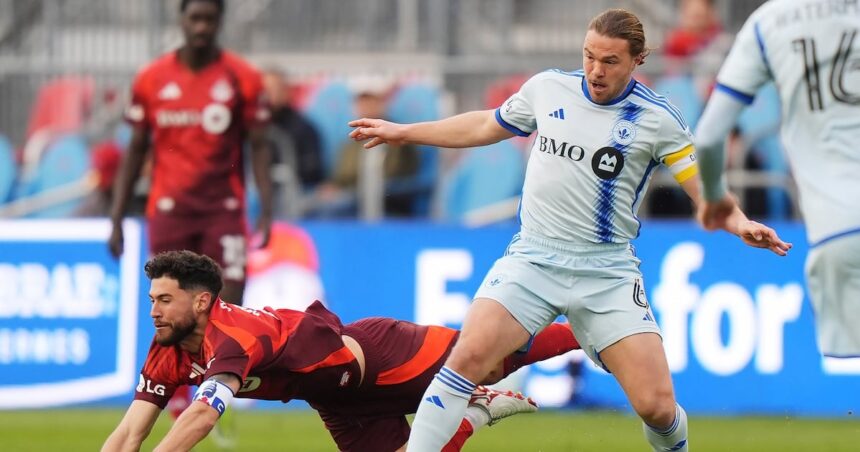After watching Toronto FC secure a rare win against CF Montréal last weekend, I couldn’t help but reflect on the team’s challenging journey this season. The 2-0 victory provided a momentary respite, but the reality of Toronto FC’s current position remains sobering.
Standing at 4-11-2 after 17 matches, TFC occupies 14th place in the Eastern Conference with just 14 points. Only D.C. United sits below them. The statistics tell a troubling story – Toronto has conceded 33 goals while scoring only 20, giving them a -13 goal differential that ranks among the worst in Major League Soccer.
“We’re building something here,” coach John Herdman told me after Saturday’s win. “These moments are important stepping stones, but we recognize the road ahead is long.”
The victory against Montréal represented TFC’s first clean sheet in 10 matches, dating back to a scoreless draw with New England on April 6. For context, Toronto has managed just two clean sheets in their last 24 matches stretching back to last season.
Federico Bernardeschi, who netted one of Saturday’s goals, shared his perspective: “This team has talent, but we need consistency. One win doesn’t change everything, but it gives us something to build upon.”
Toronto’s struggles extend beyond just this season. Since winning the MLS Cup in 2017, TFC has made the playoffs just twice in six completed seasons. Last year’s campaign was particularly difficult, with the team finishing 27th overall with a 4-20-10 record.
Ontario Soccer Association analytics specialist Jennifer Tompkins explains, “What we’re seeing is a club in transition. The roster turnover has been significant, and building chemistry takes time – something Toronto hasn’t had much of lately with frequent coaching and player changes.”
The current rebuild under Herdman began last August when he replaced Bob Bradley. Though early results suggested promise, with TFC going 2-3-3 under Herdman to close out 2023, this season has revealed the depth of reconstruction needed.
Walking through BMO Field before last weekend’s match, I noticed fewer fans arriving early and a subdued atmosphere compared to the electric environment during the championship years. Season ticket holder Marcus Williams, who hasn’t missed a home game in nine years, told me: “The passion is still here, but patience is wearing thin. We understand rebuilds take time, but this feels different – like we’ve lost our identity.”
Toronto’s defense remains a particular concern. Only the San Jose Earthquakes have conceded more goals this season. Defensive issues were apparent even during preseason, when TFC surrendered 15 goals across six matches.
Midfielder Deybi Flores offered some perspective after training yesterday: “In this league, small details make big differences. We’re working every day to fix these issues, but it takes time to build the understanding between players.”
Toronto’s offensive production hasn’t compensated for defensive frailties. Italian stars Lorenzo Insigne and Bernardeschi have shown flashes of brilliance but haven’t consistently dominated matches as their designated player status would suggest.
Sports psychologist Dr. Amanda Chen, who has worked with several professional teams in Toronto, notes: “When teams struggle for extended periods, mental barriers develop. Players begin anticipating problems rather than solutions, creating a cycle that’s difficult to break.”
The front office has acknowledged the challenges. Team president Bill Manning recently told Toronto business leaders: “We’re committed to returning this club to prominence, but we’re asking for patience from our supporters. The foundation being built now will sustain success for years to come.”
For Toronto sports fans, TFC’s struggles feel particularly painful following the remarkable championship runs of 2016 and 2017. Those teams, led by Sebastian Giovinco, Michael Bradley and Jozy Altidore, set a standard of excellence that current squads have struggled to approach.
Looking ahead, Toronto faces a busy July schedule with five matches that could define their season. While playoff hopes appear dim, establishing a competitive identity remains crucial for fan engagement and team morale.
As I headed home after Saturday’s victory, watching fans celebrate a rare win, I was reminded of Toronto sports’ resilient spirit. This city has weathered rebuilds across all its major franchises. The question isn’t if Toronto FC will return to prominence, but when – and how much more patience supporters will need before that journey completes.
For now, small victories like Saturday’s will have to sustain a fanbase hungry for the return of championship-caliber soccer at BMO Field.







